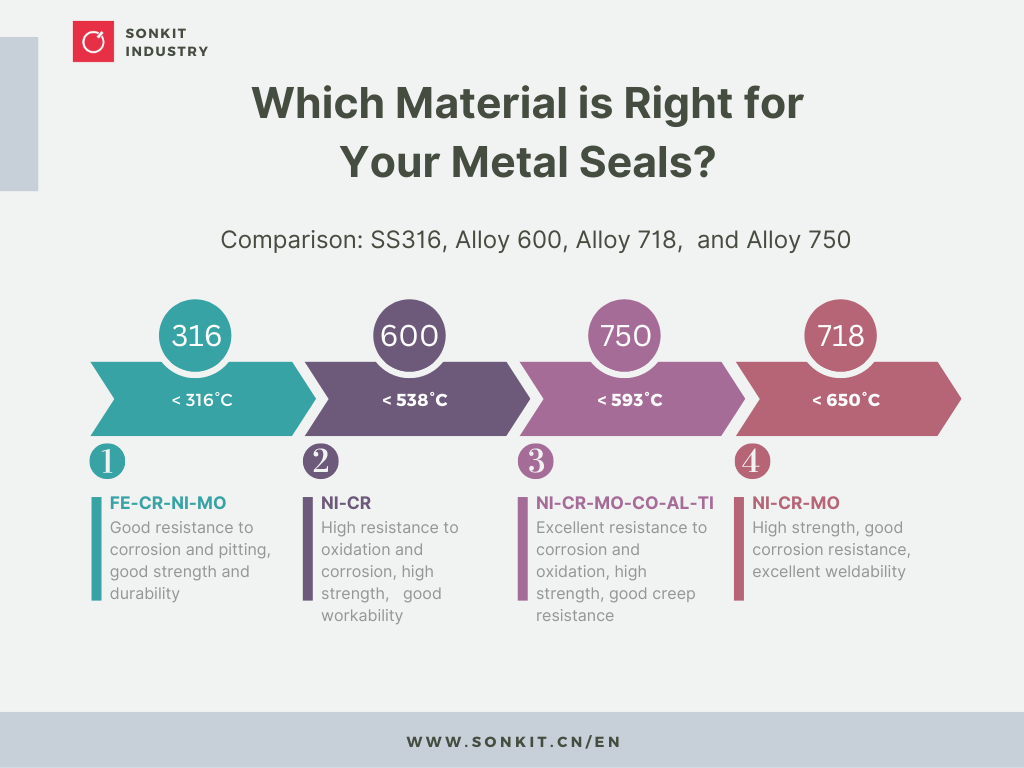Material Selection for High-Performance Metal Seals: A Comprehensive Guide
Selecting the optimal materials for metal seals is a critical factor in ensuring superior performance and longevity across diverse industrial applications. At Sonkit Industry Technology, our advanced material science expertise enables us to provide cutting-edge sealing solutions tailored to the most demanding operational environments. This guide explores the crucial aspects of material selection for metal seals, offering insights into how proper choices can significantly enhance system efficiency and reliability.

Key Factors Influencing Metal Seal Material Selection
The selection of materials for high-performance metal seals is governed by several critical factors:
- Temperature Range: Operational temperatures from cryogenic (-270°C) to extreme heat (1000°C+)
- Pressure Conditions: Ability to withstand pressures ranging from vacuum to ultra-high (100,000+ psi)
- Chemical Compatibility: Resistance to corrosive media, including acids, bases, and solvents
- Mechanical Properties: Specific strength, hardness, and ductility requirements
- Corrosion Resistance: Protection against various forms of corrosion, including galvanic and stress corrosion cracking
- Thermal Expansion Characteristics: Coefficient of thermal expansion matching or complementing mating components
- Cost-Effectiveness: Balancing performance requirements with economic considerations
Advanced Materials for High-Performance Metal Seals
Sonkit offers an extensive range of premium materials for our high-performance metal seals, including:
- Stainless Steel (304, 316, 321): Excellent corrosion resistance and strength, suitable for a wide range of applications
- Inconel (600, 625, 718): Superior high-temperature strength and oxidation resistance, ideal for aerospace and chemical processing
- Monel 400: Outstanding resistance to seawater and steam at high temperatures, perfect for marine applications
- Hastelloy (C-276, X): Exceptional resistance to pitting, crevice corrosion, and stress corrosion cracking
- Nickel 200: High purity nickel with excellent resistance to caustic alkalis
- Copper: Excellent thermal and electrical conductivity, suitable for cryogenic applications
- Aluminum: Lightweight with good corrosion resistance, ideal for aerospace applications
- Silver: Superior thermal conductivity and low outgassing properties, perfect for ultra-high vacuum applications
- Gold: Exceptional corrosion resistance and biocompatibility, used in medical and semiconductor industries
Each material is carefully selected based on its unique properties and suitability for specific operational environments and industry requirements.
Customized Material Solutions for Extreme Conditions
At Sonkit, we recognize that standard materials may not always meet the exacting requirements of certain applications. Our team of experienced metallurgists and materials engineers specializes in developing:
- Custom alloy formulations to address specific environmental challenges
- Advanced surface coatings to enhance wear resistance and reduce friction
- Composite materials combining the benefits of multiple material properties
- Nano-engineered materials for unprecedented performance in extreme conditions
These tailored solutions ensure optimal sealing performance even in the most demanding operational scenarios.
Rigorous Quality Assurance Protocols
Sonkit maintains stringent quality control measures throughout our material selection and manufacturing processes:
- Sourcing materials exclusively from ISO-certified suppliers
- Conducting comprehensive material testing, including chemical composition analysis, mechanical property verification, and microstructure examination
- Implementing statistical process control (SPC) to ensure consistent material quality
- Performing rigorous performance testing under simulated operational conditions
- Adhering to international standards such as ASTM, ASME, and API specifications
These meticulous quality assurance procedures guarantee that every metal seal meets or exceeds the highest industry standards and your specific performance requirements.

 Language
Language
 China
China German
German French
French Italian
Italian Spanish
Spanish Turkish
Turkish Arabic
Arabic Dutch
Dutch


 Service
Hotline
Service
Hotline
